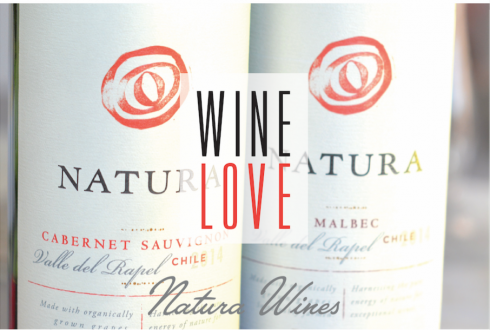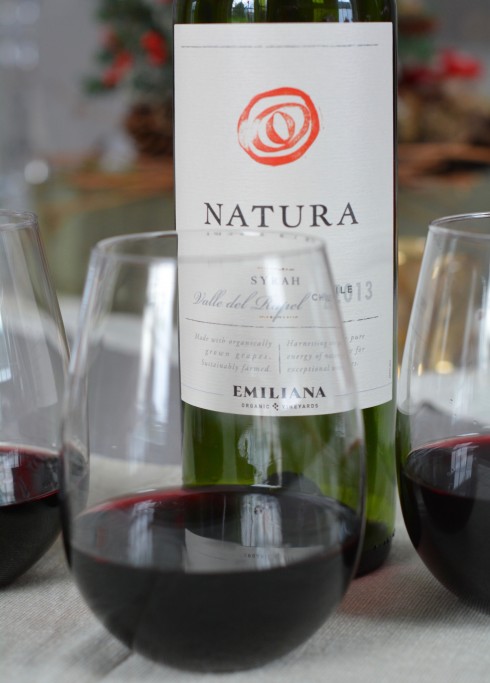Wine Love: Natura Wines

I’ve been working hard at learning a lot of about wine over the past six months. It is an area I’d like to write about more extensively. Today I am proud to share the first installment of my new Wine Love column. It features wine and all things wine related that I love. I hope in the future this includes reviews of my trips to wine destinations! First up is my review of Natura wines. Last year I was sent a few of their wines to try and today I am excited to share my thoughts on them.
About the wines: Natura wines are organic wines grown in the vineyards of Chile. The term organic in winemaking means that no pesticides, herbicides, fungicides, or chemical fertilizers are used in the vineyard. Instead, in the Chilean vineyards where grapes varietals for Natura wines are grown, flowers and native plants are used as natural pest control. The wines feature more complex flavors, especially stronger earthy notes from the terroir since no chemicals are used that would normally get absorbed through the roots of the vine and into the grape, ultimately dulling the flavor and character of the wine.
What I tasted: Chardonnay, Cabernet Sauvignon, Malbec, Pinot Noir, Merlot, Syrah – all their own varietals of organic vegan wine. You can read the official tasting notes on their website. I particularly enjoyed the Malbec, a soft fruit forward red with notes of blackberry and black pepper. It paired very well with roast chicken, spicy pork, and even tomato soup. My husband loved the Pinot Noir, a typically delicate grape to grow. It is full of bright red berry flavors with notes of baking spices and has notably soft tannins. The Cabernet Sauvignon was slightly tougher with strong notes of black fruit, jam, and dark chocolate. After opening it up for about half an hour the flavors loosened up and we paired it with a meaty mushroom stew and, the next night, pork tenderloin.
Most surprisingly, the Chardonnay was excellent. It was citrusy and bright with an intense flavor and strong aroma. It was especially enjoyable with salmon and a light pasta dish. While we normally prefer French or California chardonnays, this was excellent and I am glad we tried it. The Syrah and Merlot were both good examples of their varietal. The Syrah was preferable to us, we loved the notes of spice and cherry with hints of green herbaceous flavors. The Merlot was mellower than the Syrah with pleasant red fruit and a medium finish. For those who enjoy Merlot this is a enjoyable wine to drink and pair with a light meal.

An interview with the winemakers: I like being able to chat with the winemakers about their mission and grape growing techniques. Here is my interview with the Natura winemakers in Chile:
1) Can you further elaborate on biodynamic wines and their importance in the future of sustainable wine making?
It’s extremely important because it is going in a direction that has made quantum leaps in quality and differentiation, followed by a deep respect for nature and its cycles. Biodynamic agriculture is a combination of many factors; the utmost expression of nature including animals, plants and man as a whole, allowing each one of them to express and contribute their own. It’s very important to be able to show only wines with a unique character, and that combines perfectly with the biodynamic agriculture which has proven (since forever) to be able to produce wines with exceptional quality.
2) Can you please explain how the terroir of Chile influences the flavors of your wines?
While most of Chile’s territory is influenced by rainy winters and dry summers, within the wine region we have a great climate diversity. With drier areas up north and rainier places down south, from the foot of the Andes’s mountainside to places with great marine influence. The same thing happens with the soil: Chile has a wide range of soils with different backgrounds and different contents of clay minerals. This variability of weather and soil gives us the possibility to offer a wide range of wine, it’s how we can find all the diversity of aromas and flavors: from fruity and fresh wines to earthy, complex and full-bodied wines.
3) I love the variety of varietals you offer. Do you find that some grapes grow better than others when farmed organically? How does this effect the winemaking?
Without a doubt there’s no recipe or guideline, however the absence of synthetic pesticides, herbicides or fertilizers allows us a huge advantage because using only natural products, such as compost, improves the biodiversity in a vineyard, not only at the level of animals, insects and plants but also to level the soil microbiology. With this practice we achieve a better expression of the wine’s place of origin, decreasing the standardization and highlighting the importance of the vineyard, and allowing it to express itself, rescuing the genuine characteristics of a given variety. This is really important to me, as well as respecting the environment is closely linked to the quality of a wine.
Summary: At a general price point of between $8 and $10 these are an excellent everyday organic table wine. I also recommend supporting biodynamically produced wines and winemakers in general and encourage everyone to do so. Supporting winemakers that employ organic grape production will ultimately benefit the environment and the entire industry and yield more flavorful, interesting wines for us all to enjoy.
(Disclosure: I was sent these wines to try but was not compensated for this post. The photographs and opinions are wholly my own. I hope you all enjoy this new series.)

[…] I continue to pursue my wine education both in the classroom, and at home, I find myself constantly searching out new wines for tasting […]